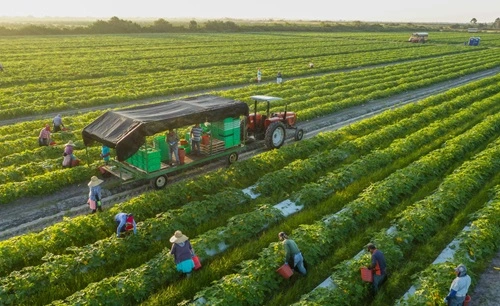Were you aware that the way farmers cultivate food organically focuses on the use of natural methods to grow crops without using any kind of chemical substances that are man-made? This means the absence of synthetic chemicals such as pesticides, and fertilizers among others instead relying on various approaches that include crop rotation, composting as well as biological control of pests thereby enabling the production of tastier healthy foods while conserving the ecosystem through pollution reduction and promotion of varied species. Selecting organic farming implies that one is backing sustainable practices that maintain the soil’s state of health alongside an equilibrium in nature thereby resulting in nutritious, harmless and palatable foods for the coming generations. We therefore should deliberate pros and cons about this.

Advantages of Organic Farming
1. Environmentally Friendly
Organic farming has a positive effect on the surrounding nature since it does not involve the use of artificial fertilizers and pesticides. This results in fewer instances of pollution than when synthetic chemicals are used in farming activities. By steering clear of these substances, organic agriculture contributes towards the equilibrium within ecosystems. So, if you are interested in environmental conservation and change in the world today, then you should consider adopting organic farming practices because they are environmentally friendly.
2. Healthier and Tastier Produce
Perhaps you’ve realized the way great organic fruits and veggies taste. It is because they are produced without toxic substances. Organic produce is usually healthier and tastier compared to what you find in local stores. By choosing organic food, not only are you benefiting your body but you are also getting something that tastes outstandingly good. This is the best option for both my well-being and my enjoyment of meal times in general.
3. Sustainable Soil Management
Crop rotation and composting are examples of organic farming practices that enhance soil health which in turn makes it more productive in terms of fertility levels. They improve soil structure by increasing the ability of the latter to retain water along with essential nutrients. As a result, crop production increases whereas the existing farming system becomes more ecologically sound. Organic farming is therefore the most appropriate method of farming if one wishes to keep their piece piece of farmland productive well into the future.
4. Support for Biodiversity
By preventing pest outbreaks and minimizing disease risks, one way by which organic farming methods contribute to this end is by supporting Biodiversity. Organic farming is a good means to maintain the wildlife and vegetative varieties if saving them makes you enthusiastic.
5. Reduction of Chemical Residues
It could be said that one of the best things about organic farming is that does not lead to harmful chemical residues on food, hence, when you are consuming organic produce there are no synthetic pesticides or fertilizers in them. The upshot of this is that it is not only good for your body but also one that makes someone feel comfortable with the fact that his or her food is pure and organic. Deciding to eat organic food if you want to eat safely or healthily is very wise.
6. Enhanced Pest and Disease Resistance
Strengthening plants makes them more resistant to pests and diseases using Organic farming. Essentially, it is a process by which farmers use healthy soil and crops to create an ecosystem of defence against such threats, that is natural. Environmental friendly health wise also because it requires less chemical interference which can be harmful in the long run. You can choose an organic farming method if you want to choose how farming should remain within it.
Disadvantages of Organic Farming
1. Higher Costs
Organic production is more costly due to high production expenses as well as high costs associated with labour input together with low per unit yield. Indeed, pricing for organic food is always higher compared to conventional prices which could lead to inaccessibility by a particular group of individuals. Get ready when going for organic farming because you will buy food expensively at the market.
2. More Labor-Intensive
For example, in organic farming, there is more time spent on tasks such as weeding and pest control because they are carried out manually. As a result of this, farmers are involved in increased physical activities related to these practices which lead to more costs on labor. So, potential organic farmers need to bear in mind that they must go the extra mile.
3. Lower Yields
During the first years of transition, the levels of crop production on organic farms are always lower compared to conventional farms. This makes it difficult for them to meet the market demands as well as affect their profits. If you wish to change from conventional to organic farming, there is a need for patience as well as being prepared so that you start with low yields.
4. Shorter Shelf Life
Organic items spoil quicker than non-organic ones because the former lack preservatives; hence more wastage. Whenever one goes for the natural option, one should either eat it as soon as possible or preserve it to prevent unnecessary wastage.
5. Marketing and Infrastructure Challenges
It can sometimes be hard for organic farmers to sell their products due to a lack of proper infrastructure as well as markets which may lead to customers being hard to reach thus affecting growth rates. The amount of hard work that such farmers put into marketing their farm produce to get potential buyers is a major factor that slows down their development over time.
6. Pest and Weed Management Issues
It can be quite difficult not to use chemicals to control pests and weeds. The ways of organic farming are not always effective so farmers risk losing the yield. This calls for inventiveness from the farmers who will need to put in more work to ensure that their plants are not affected. Thus any individual going green has to be creative and relentless in overcoming such difficulties.
Quick Advantages and Disadvantages of Organic Farming
| Advantages | Disadvantages |
| Reduces pollution and healthier ecosystems. | More expensive for consumers. |
| More nutritious and flavorful without chemicals. | Requires more manual work. |
| Improves soil health and fertility naturally. | Produces fewer crops initially. |
| Encourages diverse crops and wildlife conservation. | Spoils faster without preservatives. |
| Ensures safer, cleaner food consumption. | Harder to reach customers. |
| Better natural resistance to pests and diseases. | Less effective without chemicals. |


